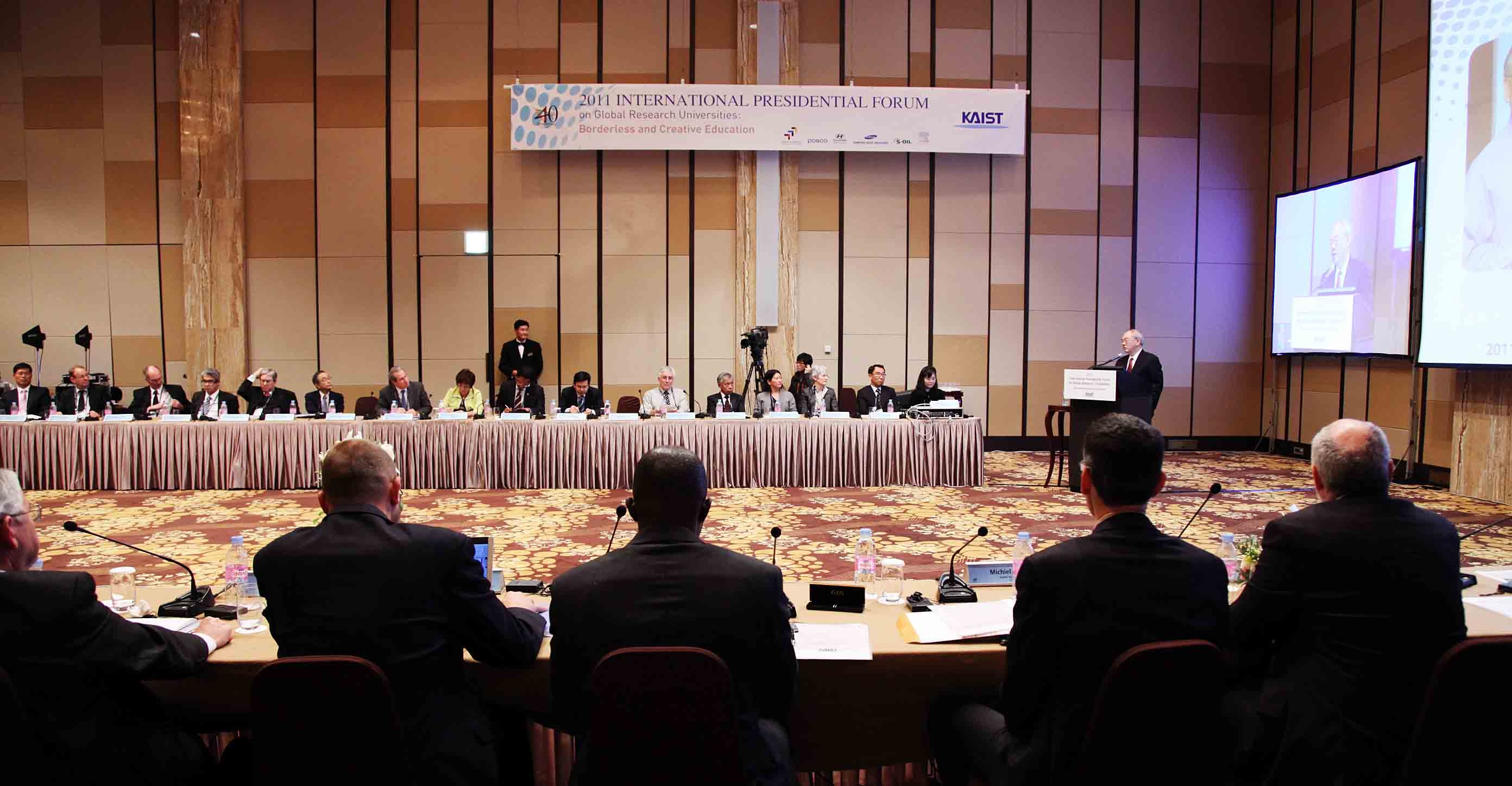event
KAIST’s 4th International Presidential Forum Held in Seoul on November 8, 2011
The largest annual congregation of university presidents in Asia invited leaders from academia, government, and industry for talks on issues related to higher education in the Age of Globalization.
Borderless and Creative Education: the ability to cross borders a crucial key to dominate the information era
Seoul, Republic of Korea, November 8, 2011—The Korea Advanced Institute of Science and Technology (KAIST) hosted the “2011 International Presidential Forum on Global Research Universities (IPFGRU)” on Tuesday, November 8, 2011 at the Millennium Hilton Hotel in Seoul.
With more than 120 participants from 44 institutions in 27 countries present, the full-day forum provided participants with an opportunity to discuss challenges and responsibilities facing higher education in a time of globalization that has resulted from an ever-growing demand for technological innovation.
In his plenary speech, Dr. Robert Birgeneau, Chancellor of UC Berkeley, stressed that “Higher educational intuitions must be prepared to drive innovation and enhance competitiveness by educating a highly trained workforce that will have the critical skills necessary to solve problems and lead in today’s interdependent world.”
“Finding solutions to the world’s most challenging problems will depend on the ability to cross borders: national borders, border between different fields of discipline and research, and borders between academe, government, and industry,” said Chancellor Birgeneau to address the importance of “borderless and creative education,” the theme of the forum.
Other major keynote speakers were Jörg Steinbach, President of Technische Universität Berlin, Lars Pallesen, President of Technical University of Denmark, Paul F. Greenfield, President of University of Queensland, Marcelo Fernandes de Aquino, President of the University of the Sinos Valley (UNISINOS), and Eden Woon, Vice President of the Hong Kong University of Science and Technology.
Dr. Nam-Pyo Suh, President of KAIST, gave talks on the university’s new education plan, “The I-Four Education,” at the afternoon session. The four Is are information technology (IT), independent learning, integrated knowledge acquisitions, and an international learning environment.
“In this format, there are no formal lectures,” President Suh explained. “A group of students learn together by using the materials available on the internet, doing homework and conducting experiments together. Pre-recorded lectures are delivered in English by I-Four professors, some of them regular KAIST professors and some professors in other countries who participate in the I-Four Program as consulting professors.”
He added, “The overall purpose of the I-Four Education Program is to encourage students to learn independently, gain exposure to the best lectures by the most eminent professors in the world, accelerate the development of a global frame of reference in the students by dealing with information available throughout the world, and provide an integrated learning environment by using diverse examples from many disciplines to achieve understanding of basic principles.”
The 2011 IPFGRU, the fourth forum since its inception in 2008, rose to prominence in the past years as an international network for leaders of research universities from around the world to share information and exchange views about contemporary issues in higher education.
At this year’s forum, entitled “Borderless and Creative Education,” speakers took a deeper look into the transitions and transformations many research universities are undergoing today, delving into the following topics: the development of e-learning and cyber campuses; increased student mobility and international collaborations; multi-disciplinary and convergence approaches in research and education; and methodology of nurturing future global leaders.
Participants also discussed experiences and accomplishments earned from their own endeavors to accommodate such changes and presented ways to strengthen internationalization and improve the academic and research competitiveness of universities.
The 2011 International Presidential Forum on Global Research Universities (IPFGRU) was organized by KAIST and sponsored by the Ministry of Education, Science and Technology, POSCO, Hyundai Motor Company, Samsung Heavy Industries, S-Oil, and Elsevier Korea.

-
event KAIST Hosted the 6th International Presidential Forum on Global Research Universities
More than 120 global leaders from higher education, private and public sectors, to discuss the promotion of economic growth through knowledge creation and entrepreneurship The Korea Advanced Institute of Science and Technology (KAIST) held the 6th International Presidential Forum on Global Research Universities (IPFGRU) on October 15th at the Westin Chosun Hotel in Seoul, Republic of Korea. About 64 presidents and vice presidents from 57 research universities in 28 nations attended for a prese
2013-11-04 -
event Declaration of 2011 International Presidential Forum on Research Universities
The 4th International Presidential Forum on Research Universities was held in Seoul on November 8, 2011. The forum attracted a wide range of participants from around the world, presidents and leaders from 44 higher education institutions in 27 nations. Participants had a full-day of in-depth discussion on the theme of “borderless and creative education.” At the end of the forum, 29 keynote speakers, representing 120 attendees of the meeting, released a declaration that sums up the
2011-11-09 -
event Research University Presidents Discuss Global Network to Increase Cooperation
Presidents and leaders of research universities participating in the 2008 International Presidential Forum on Global Research Universities (IPFGRU) held at the Westin Chosun Hotel in Seoul, Korea on Sept. 8, 2008 exchanged views and ideas on how to build and effectively utilize a global research network in order to increase cooperation and exchanges among institutions of science and technology across the world. The participants agreed on the need to promote the sharing of expertise and facilit
2008-09-18